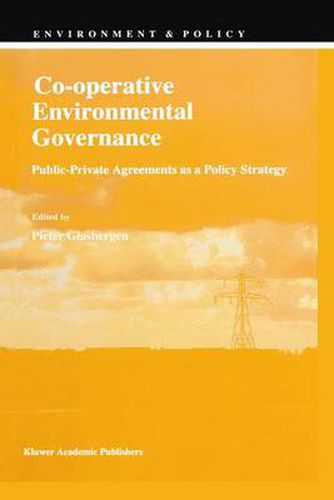Readings Newsletter
Become a Readings Member to make your shopping experience even easier.
Sign in or sign up for free!
You’re not far away from qualifying for FREE standard shipping within Australia
You’ve qualified for FREE standard shipping within Australia
The cart is loading…






This title is printed to order. This book may have been self-published. If so, we cannot guarantee the quality of the content. In the main most books will have gone through the editing process however some may not. We therefore suggest that you be aware of this before ordering this book. If in doubt check either the author or publisher’s details as we are unable to accept any returns unless they are faulty. Please contact us if you have any questions.
The common denominator of modern environmental governance is co-operation between public and private parties. Of course, co-operation is nothing new in itself. The novelty lies in its planned form. In co-operative environmental governance the parties commit themselves, through a more or less binding agreement, to resolve specific environmental difficulties. When co-operation is embedded in environmental policy, it becomes a means to achieve the environmental objectives of the state. The essays which make up this volume explore this option in environmental governance: the nature of the approach, the preconditions, and its chances of success. They take an interdisciplinary approach to the task, analyzing theoretical issues and practical experiences in a number of countries.
$9.00 standard shipping within Australia
FREE standard shipping within Australia for orders over $100.00
Express & International shipping calculated at checkout
This title is printed to order. This book may have been self-published. If so, we cannot guarantee the quality of the content. In the main most books will have gone through the editing process however some may not. We therefore suggest that you be aware of this before ordering this book. If in doubt check either the author or publisher’s details as we are unable to accept any returns unless they are faulty. Please contact us if you have any questions.
The common denominator of modern environmental governance is co-operation between public and private parties. Of course, co-operation is nothing new in itself. The novelty lies in its planned form. In co-operative environmental governance the parties commit themselves, through a more or less binding agreement, to resolve specific environmental difficulties. When co-operation is embedded in environmental policy, it becomes a means to achieve the environmental objectives of the state. The essays which make up this volume explore this option in environmental governance: the nature of the approach, the preconditions, and its chances of success. They take an interdisciplinary approach to the task, analyzing theoretical issues and practical experiences in a number of countries.